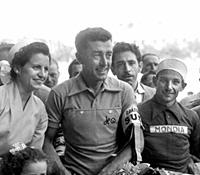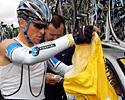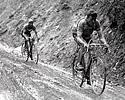
Recently on Cyclingnews.com |
Louis Bobet, October 22, 2006
Refusing the Maillot Jaune
Nearly sixty years ago one rider refused to wear the yellow jersey and it was for natural reasons. In 1947, after taking the overall lead, Frenchman Louis Bobet almost turned the Tour de France sponsorship on its head. Les Woodland recalls why Bobet did not want to accept cycling's coveted jersey.

|
If you've never speculated on the revenge you'll take on your last day at work - telling the boss what you really think, dropping a few home truths and then leaving the office with a slam of the door - then you are a saint. This world isn't good enough for you. But what do Tour riders dream of? Do they amuse themselves with thoughts of climbing the podium, accepting the yellow jersey and then handing it back with a polite "No, thanks!"?
Well, if they do, they wouldn't be the first. I'm not talking of riders like Eddy Merckx and Ferdy Kübler, who declined to wear the maillot jaune because they had gained it only through the misfortune of the previous holder. I'm talking of simply taking the jersey, looking at it and then turning up your nose because it isn't good enough.
Unbelievable? Well, it's happened. It was 1947 and the rider concerned was Louis Bobet, still known by that name because the family diminutive of Louison hadn't caught on. He was 22, he was riding his first Tour de France - the first Tour after the war, in fact - and he had achieved what everyone man in France dreamed of becoming: the leader of the Tour de France.
And yet he wouldn't wear the jersey.
The problem was that the organiser, Jacques Goddet, had been pleased to accept the sponsorship of a company called Sofil. Sofil made artificial yarn for clothing, a forerunner of Lycra and all the fabrics we know now. Sofil hadn't been able to make a yellow jersey entirely from its products but their confidence in what they made and the investment that the company had put into sponsorship meant they insisted on mixing some of their yarn into the pure wool of the jersey. And that was what Bobet was having nothing of.
Bobet was an idealist, a slightly driven and unearthly man who had his own ideas and stuck to them rigidly. He was particularly taken by health matters, to the extent that he invested his money in the unknown seawater health treatment of thalassotherapy. Now thalassotherapy is a tourist attraction on France's coast, especially in the southwest where Bobet set up business, but in those down-to-earth, cash-strapped days it says something of Bobet's convictions that he was happy to place his life savings into the venture.

|
Bobet's argument against the jersey was that cyclists had always worn wool, that wool was natural and just what racing cyclists needed for their long days of sweating in the heat and dust. It was a matter of hygiene. Artificial fabrics didn't transmit sweat. Indeed, he said, they encouraged it. And since he long had and would always have a problem with boils, on his saddle area and elsewhere, well, thank you very much, but no, nothing but a pure woollen jersey would do.
"It produced a real drama", Goddet recalled. "Our contract with Sofil was crumbling away. If the news had got out, the commercial effect would have been disastrous for the manufacturer."
Happily for sponsor and race, Bobet had accepted the jersey at the finish and only that evening decided to send it back. Goddet was having dinner when the news arrived. You can imagine the indigestion. He dropped his knife and fork right then and went to Bobet's hotel, a short journey because in those days the Tour was still small enough that riders could almost always be accommodated in the same town.
"I remember debating it with him a good part of the night," Goddet recalled. "Louison was always exquisitely courteous but his principles were as hard as the granite blocks of his native Brittany coast."
No compromise was possible. Calling in the sponsor's agents on the race, Goddet had to get them to promise to produce another yellow jersey overnight, their logo still visible but their artificial fabric entirely absent.
In the end the drama died away. Bobet wore his all-wool jersey, the news didn't get out, and he didn't finish the Tour anyway. The problem of artificial jerseys took a long time to evaporate, though. To prove that new fabrics destined to change the clothing world are perfect even for the sweating, heaving riders of the Tour de France is a big attraction for a manufacturer. And for the Tour de France, always strapped for cash during the 30 years that followed the war, and for its organiser, L'Equipe, which struggled to remain a commercial proposition.

|
Artificial fibres made their way back in the 1980s but, snazzy though they were with their new screen-printed designs (rather than the flocking and, before that, the ruinously expensive embroidering of logos), they were mobile saunas. Turn up pictures of the time and you'll see riders with their jerseys fully unzipped on the hottest stages, baring their pale chests to the burn of the southern sun. It wasn't macho fashion: it was survival.
The next fabric was Rovyl, until then better known for underwear. And then finally cycling caught on to Spandex, one of the first sports to see the value in an artificial rubber first made in 1959. The research, by the American chemist Joseph C. Shivers, had started just about the time Bobet handed back his maillot jaune.
You may not know Spandex. Even DuPont wasn't sure of the name and began calling it Fiber K. Perhaps because that sounded more like a breakfast cereal, the hunt began for yet another name and DuPont hit on Lycra. That's how you'll know it now. Just like Bobet's hated Sofil, it's always mixed with other fibres to produce the eventual fabric. It's the different mix of fabrics that lets clothing makers invent their own fancy names.
So, was Bobet wrong all those years ago? Well, yes and no. He didn't know the path of history, of course, and he had to live in the world of 1947 and not where we are now. Keeping yourself clean was more of a problem then, especially in rural France where water came cold and not necessarily pure and washing of clothes was done by hand and just once a week. Cleanliness was a little further from godliness in a society which worked all day in vegetable fields and cow sheds, got dirty and expected to get dirty again the next day and, again, the day after that. For a man whose career was lessened if not shortened by boils, Bobet's unwillingness to take risks was understandable. But if there's a cyclists' heaven, he'll be there right now with his mouth wide open at what has followed in his Tour de France.
